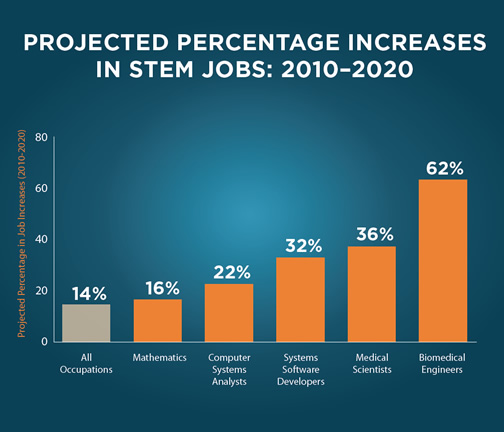STEM Policy Recommendations for 2016 Presidential Candidates
 Immigration, terrorism and now a vacant Supreme Court seat are hot topics among the U.S. presidential candidates. There has been very little discussion about the jobs of the future, namely jobs in the STEM sector. Nearly a quarter of all jobs today require a high level of knowledge in any one STEM field, and STEM workers earn 11 percent higher wages compared with their same-degree counterparts in other fields.
Immigration, terrorism and now a vacant Supreme Court seat are hot topics among the U.S. presidential candidates. There has been very little discussion about the jobs of the future, namely jobs in the STEM sector. Nearly a quarter of all jobs today require a high level of knowledge in any one STEM field, and STEM workers earn 11 percent higher wages compared with their same-degree counterparts in other fields.
STEM fields are seeing the highest rates in job growth. STEM occupations are projected to grow by 17 percent from 2008 to 2018, compared to 9.8 percent growth for non-STEM occupations. However, not many students are going in this direction. According to the U.S. Department of Education, only 16 percent of American high school students are proficient in math and have interest in pursuing a STEM career. “The United States is falling behind internationally, ranking 25th in mathematics and 17th in science among industrialized nations.” Advanced Placement computer science is only taught in five percent of American high schools.
Although President Obama has pledged $4 billion towards computer science education, a lot more has to be done to beef up the STEM sector, especially by the next president coming in next year.
The STEM Education Coalition created a comprehensive list of policy recommendations for the 2016 Presidential candidates.
I like all the recommendations!
- Appoint a high-profile STEM education coordinator at the White House whose role will be to drive a STEM agenda across the federal government .
- Appoint qualified STEM education professionals to a wider range of federal advisory bodies, such as the President’s Council of Advisors on Science and Technology and the National Science Board, and in White House and other senior federal agency policymaking positions.
- Convene a summit during the first 100 days at the U.S. Department of Education, led by the Secretary, with state, local and national STEM stakeholders, including business and workforce groups, to highlight and discuss major STEM policy issues with the goal of seeking input into a broad federal STEM agenda.
- Encourage states to emphasize student performance in science, alongside reading and mathematics, when developing, evaluating and implementing the accountability provisions under the Every Student Succeeds Act.
- Direct the Secretary of Education to prepare an annual report to assess the degree to which states are utilizing the new authorities provided under the Every Student Succeeds Act to support and prioritize STEM education activities and student success.
- Publish an online guide for educators and students that showcases federal resources available to support STEM education and highlights research on best practices in teaching and learning and emerging areas such as STEM competitions, advancements and integration of informal learning, exciting opportunities for students, and increasing women and minority participation in STEM learning.
- Utilize the authority provided to the Secretary of Education by Section 2245 (STEM Master Teacher Corps) of the Every Student Succeeds Act to propose a national initiative to support high quality STEM initiatives in 5-10 leading states.
- Adopt a balanced approach to supporting community colleges, technician trade schools, and other degree granting institutions of higher education through federal post-secondary workforce education and training programs.
- Integrate the goal of broadening the STEM education pipeline, especially to women, girls, and students from underrepresented backgrounds, in the Administration’s proposals for the reauthorization of the Higher Education Act.
- Propose robust, predictable, and sustained support for the National Science Foundation, including full funding of NSF’s Education and Human Resources Directorate and other agency efforts to develop a rigorous education research base to inform innovations in teaching, learning, and educational materials development.
